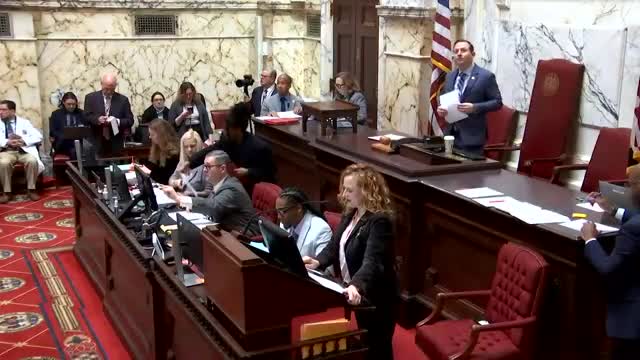Senate debates bill standardizing gun buyback procedures; questions remain over mandatory tracing of turned-in firearms
Get AI-powered insights, summaries, and transcripts
Subscribe
Summary
ANNAPOLIS, Md. — The Maryland Senate on Wednesday debated Senate Bill 444, a measure that would set statewide rules for gun buyback programs, adopting two committee amendments and then moving the bill to a special order for consideration the following day.
ANNAPOLIS, Md. — The Maryland Senate on Wednesday debated Senate Bill 444, a measure that would set statewide rules for gun buyback programs, adopting two committee amendments and then moving the bill to a special order for consideration the following day.
SB444, sponsored in the chamber as "Senate bill 444, Senator Smith, public safety, gun buyback programs, destruction of firearms," would require that firearms traded for compensation in buyback events be destroyed or rendered permanently inoperable, while preserving language that allows law enforcement to retain firearms for investigation or to return them to lawful owners.
Senator Smith, sponsor of SB444, told the chamber after the committee amendments were adopted that the bill "is silent" on whether agencies must run a trace on every firearm turned in and emphasized the measure mostly clarifies existing practice. "This just says if you do this, this is how you have to do it," Smith said. He added that chiefs and sheriffs requested language making clear that firearms suspected to be stolen or used in crimes may be retained as evidence or returned to lawful owners.
A senator identified in the transcript as the senator (30th/37th District) pressed for an explicit, statutory mandate that every firearm turned in be checked to ensure it is not evidence in a crime. The senator posed a hypothetical in which someone could turn in a firearm used in a crime and later be paid for a "smoking gun," asking whether the bill would prevent that outcome. "So if we turn in a firearm, if that person had used that firearm in a crime, and that could have been the crime that we were, that weapon had evidence. Somebody could just walk in. We could pay them for turning in a smoking gun, and they would be paid for it and the gun would be destroyed?" the senator asked.
Senator Smith replied that the bill makes clear current law enforcement practice can continue: agencies generally run traces on firearms turned in at buybacks and may retain firearms suspected to be stolen or connected to crimes. "The chiefs and sheriffs came in and said, hey, look, we understand you want to destroy these. That's the practice we engage in right now anyway. But we want to make sure that the law is clear on this," Smith said. He also told colleagues that if senators wished to require an affirmative, universal trace mandate, they should consider a separate bill next year.
The chamber adopted two committee amendments to SB444 "without objection." Later in the day senators moved to special-order the bill to "the appropriate time tomorrow." The motion was made and the bill was special-ordered for consideration the following day; no final floor vote on passage occurred Wednesday.
The sponsor said the bill itself does not create an explicit financial obligation to run traces; "the bill is silent on that," Smith said when asked about fiscal consequences. That means, as drafted and as amended, the statute would standardize the disposition of firearms surrendered for compensation but would not require agencies to allocate staff or funds specifically to run traces for every firearm turned in.
Where it stands: SB444 has committee amendments adopted, and the Senate has special-ordered it for further consideration on the next day's calendar. No final passage vote was recorded in Wednesday's session.
Editor's note: The discussion cited pages and line numbers in the committee amendment (page 3, lines referenced by the sponsor), and senators referenced current practices described by chiefs and sheriffs. The bill text and fiscal notes will be the definitive source for what the law requires if the Senate ultimately passes the measure.
